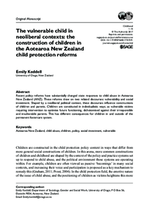Abstract
Recent policy reforms have substantially changed state responses to child abuse in Aotearoa New Zealand (ANZ). These reforms draw on two related discourses: vulnerability and social investment. Shaped by a neoliberal political context, these discourses influence constructions of children and parents. Children are constituted in individualistic ways; as vulnerable victims requiring intervention to optimise future functioning, dichotomised against their irresponsible and invulnerable parents. This has different consequences for children in and outside of the permanent foster care system.

